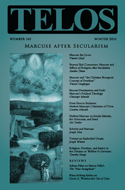Vincent Geoghegan’s “Marcuse and ‘the Christian Bourgeois Concept of Freedom'” appears in Telos 165 (Winter 2013). Read the full version online at the Telos Online website, or purchase a print copy of the issue in our store.
 Current talk of the post-secular necessarily invites analysis of the nature of the secular, particularly its historical genesis and subsequent development. The task is to reject what Charles Taylor in A Secular Age has termed “subtraction stories” of the emergence of secularism, involving simplistic assumptions about the inexorable evaporation and attenuation of the religious, and instead understand the complex constitutive role religion has played in the construction of the secular. Marcuse’s work is of interest in this respect because beginning with his 1930s analysis of what he terms “the Christian bourgeois concept of freedom” within the Protestant Reformation, he explores the ways in which he believes modern secular society emerged out of Christianity.
Current talk of the post-secular necessarily invites analysis of the nature of the secular, particularly its historical genesis and subsequent development. The task is to reject what Charles Taylor in A Secular Age has termed “subtraction stories” of the emergence of secularism, involving simplistic assumptions about the inexorable evaporation and attenuation of the religious, and instead understand the complex constitutive role religion has played in the construction of the secular. Marcuse’s work is of interest in this respect because beginning with his 1930s analysis of what he terms “the Christian bourgeois concept of freedom” within the Protestant Reformation, he explores the ways in which he believes modern secular society emerged out of Christianity.


